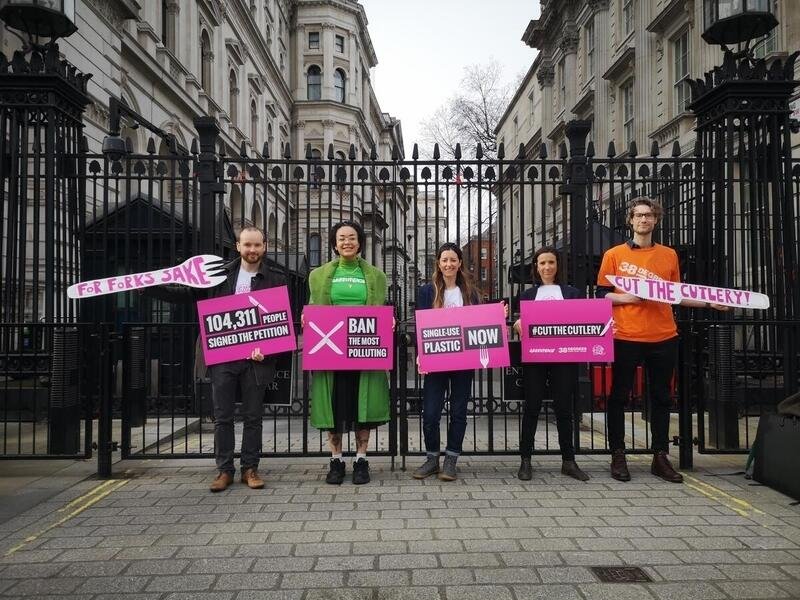Legally binding plastics targets
Once these very minimum standards have been introduced, the campaigners are calling on the government to go much further through the target setting process of the Environment Act.
They’re calling for legally binding targets for single-use plastic reduction and reuse within the Environment Act, with the aim of a 50% reduction by 2025 and 25% of packaging to be reusable by 2025.
Public’s views on plastics
The government’s consultation, which closes this weekend, seeks views on banning single-use plastic plates, bowls, trays, cutlery, balloon sticks and polystyrene food and drinks containers.
51,462 members of the public submitted their views into the consultation via 38 Degrees and City to Sea, with support for the ban peaking at 98.3% for polystyrene food containers. 94% of respondents also said there should be no exemptions.
87% of respondents also disagreed with government plans to continue allowing plastic plates that are classed as ‘packaging’ – for example, where they’re filled with food at the point of sale, such as from a food truck. The vast majority said a ban should include all plastic plates.
‘Whilst we welcome the banning of a few of the plastics that are most commonly found littered in our natural environment, we need to be clear; we’re a long way off from being ‘world leaders’ in tackling plastic pollution. These are the first baby-steps in a long journey ahead. The public has removed any room for doubt that DEFRA may have had, they need to crack on and ban these most polluting single-use plastics without any more delay or feet dragging. Once this has happened we can seriously start to address the other sources of plastic pollution.
‘To address the other sources of plastic pollution we need two big policy announcements. The first, and this has to happen as part of the Environment Act target setting process, is to see a legally binding target to reduce single-use plastics as a whole by 50% by 2025. The second is to turbocharge the refill and reuse revolution. We are calling on the government to set a target of 25% of all packaging to be reusable or refillable by 2025. We have the answers to the plastic pollution crisis, the public supports them, now all we need is the political will.’
STEVE HYND
City to Sea’s policy manager
Timings and bioplastics
Almost two-thirds (64%) also say the ban should kick in sooner than the government’s April 2023 start date, with 35% agreeing with the proposed date. Just 2% said it should be later.
Two-thirds (67%) of respondents said they’d be ‘very willing’ to pay more for products and services that used packaging in a more sustainable way, with a further quarter (25%) ‘slightly willing’.
Importantly, 61% also said that bio-based, compostable and biodegradable plastics should also be banned – something that the campaigners have dubbed “critical” for tackling plastic pollution.
The wide-scale use of material substitutes such as bioplastics should be regarded with caution. Bioplastics can be harmful to the environment and won’t shift people or companies away from a culture of throwaway packaging.
‘After years of talking about being a global leader in tackling plastic pollution, the government has managed to crack down on a grand total of four single-use plastic items and microplastics. The UK public has long been willing and ready to move on from polluting throwaway plastic. Will the government catch up and reduce single-use plastics by 50% by 2025?’
MAJA DARLINGTON
Campaigner at Greenpeace UK
 Play Video about This Rock Might Just Save The World
Play Video about This Rock Might Just Save The World Play Video about Play 2 hours of rock
Play Video about Play 2 hours of rock Play Video about Play 2 hours of brook
Play Video about Play 2 hours of brook Play Video about Play 2 hours of sheep
Play Video about Play 2 hours of sheep











































